Chief Justice Martha Koome addressed concerns regarding the implementation of Judicial services in Huduma Centers following objections from lawyers represented by the Law Society of Kenya (LSK). They argued that this move could potentially result in a rise in unethical behaviours.
However, she reaffirmed her support for and emphasized the importance of establishing judiciary desks at the government centres, during a session with representatives from the LSK national office at the Supreme Court of Kenya.
“The assisted filling desks are purely registry services. They will be manned by the Judiciary’s registry staff who are under firm instruction to restrict their duties to assist self-represented litigants to upload their pleadings on the e-filling portal,” she said.
She noted that some Court users especially the vulnerable and indigent ones, were locked out by the move as they faced barriers in accessing and using the technologies deployed by the courts.
According to Koome, the introduction of Judicial services at Huduma Centers is aimed at addressing such incidents.
The implementation of these services was in response to a court directive for the Judiciary to create programs and initiatives to mitigate the risk of digital exclusion.
Issued in 2021 by the High Court of Kenya, this order coincided with the rollout of online filing and virtual hearing programs by the Judiciary.
Essentially, the directive mandated the government arm to execute these initiatives to guarantee that individuals seeking court services receive necessary ICT assistance.
While the initiative is presently in a pilot phase, with desks being set up in specific huduma centers nationwide, CJ Koome welcomed constructive and consultative engagement aimed at “strengthening the operational protocols.”
“We are willing to listen to any suggestions/proposals on how to strengthen the operating protocols to ensure masquerades do not exploit these assisted filling desks,” she said.
Registry services provided at Huduma Centres encompass a range of functions, such as filing civil matters, submitting documents for ongoing cases, requesting and receiving mention dates, addressing general inquiries, and accessing rulings and court orders.
Additionally, services include e-filing support and facilitating payments for fines, deposits, and cash bail.
















